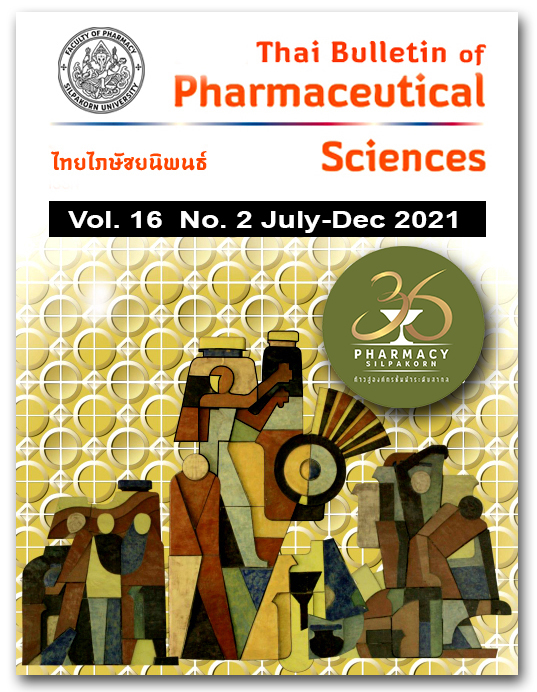PREVALENCE AND FACTORS ASSOCIATED WITH STEROIDS ADULTERATION IN TRADITIONAL MEDICINES AND DIETARY SUPPLEMENT PRODUCTS IN COMMUNITY OF MUANG DISTRICT, NAKHON PATHOM PROVINCE
DOI:
https://doi.org/10.69598/tbps.16.2.83-95Keywords:
steriods, traditional medicines, Dietary supplement, adulterationAbstract
Currently, steroid adulteration in health products that are available to communities is the major problem of steroid misuse. This research aimed to determine the prevalence and factors associated with steroid adulteration in traditional medicines and dietary supplements. Sample products were collected from the communities in Muang District, Nakhon Pathom Province between December 2018 and March 2019. Steroid adulteration was examined using steroid test kits from the Department of Medical Sciences. Descriptive statistics, Chi-square test and Fisher’s Exact test were used for data analysis. Of 144 products being surveyed, 90 were traditional medicines (TM) (62.50%). Most of the TM were tablet/bolus (29.86%), unlabeled (34.72%) and falsely labeled (46.53%). In regard to dietary supplements (DS), 54 items were found (37.50%). They included capsule (20.83%), unlabeled (4.86%) and falsely labeled (11.81%). The adulteration of steroids (prednisolone and/or dexamethasone) was found in 29 (32.22%) TM products. No adulteration of steroids was found in DS. The steroid adulterated products were TM without registration numbers and with false labels. In addition, the dosage form (p=0.016), label (c2= 7.15, p=0.007), (p<0.01) and accuracy of label information (p=0.001) were statistically significantly associated with steroid adulteration in the TM products. The results indicated that there were problems related to unsafe TM and DS products in communities, and thus, proactive surveillance and consumer empowerment are needed to ensure the safe consumption of future health products.
References
Drug system monitoring and development centre. Steroid distribution control. [Internet]. C2014 [updated 2014; cited 2021 April 20]. Avaliable from: www.thaidrugwatch.org/ download/series/series15.pdf (in Thai)
Drug system monitoring and development centre. Don’t let the steroids go unpunished. [Internet]. C2012 [updated 2012; cited 2021 April 20]. Avaliable from: www.thaidrugwatch.org/download/series/series22.pdfInsights into the health system (in Thai)
Asipong S. Health product use behavior with no medical indications among patients with chronic diseases at Rasi Salai, Sisaket Province. Thai J Pharm Prac. 2015;7(2):105-13. (in Thai)
Warning of danger found “Modern medicine and steroid” adulterated in food and drink. [Internet]. C2016 [updated 2016 May 21; cited 2021 April 20]. Avaliable from https://www.hfocus.org/content/2016/05/12202 (in Thai)
Nutsathapana C. Adulteration of modern medicines in herbal medicine throughout the country. FDA J. 2012;3(19):71-6. (in Thai)
Ruenruay S, Saokaew S. Situation of medicines and dietary supplements in the health provider board region 3. Thai J Pharm Prac. 2017;9(1):225-35. (in Thai)
Ministry of Public Health and Public and Non-Governmental Organizations. National master plan on the development of Thai herbs. 1st ed. Nontaburi: TS interprint: 2016 (in Thai)
Pooprasert O, Nuengsigkapian P, Sriphong L, Satiraphan M, Burana-osot J, Pochanakom K, et al. Detection of steroids in traditional and herbal medicine. Thai Bull Pharm Sci. 2002;1(1):7-16. (in Thai)
Klinsoonthorn N, Noyprasert P. Steroid in herbal drug at the 4th Public Health Region. Reg 4 Med J. 2001;3(20):178-81. (in Thai
Woraphongsathorn T. Principles of research in public health. 4th ed. Bangkok: Chulalongkorn University Press: 2000 (in Thai)
Department of Medical Sciences. Steroid test kit for traditional medicine (Technique IC). [Internet]. C2018 [updated 2018; cited 2021 April 20]. Avaliable from http://testkit.dmsc.moph.go.th/page-view/125 (in Thai)
Drug Act, B.E. 2510. Royal Thai Government Gazette. No.84; Section 101 (1967, Oct 21) [Internet]. [cited 2021 April 20 ] Available from: http://www.ratchakitcha.soc.go.th/DATA/ PDF/2510/A/101/7.PDF (in Thai)
Dietary Supplement: Notification of Ministry of Public Health B.E.2548, Royal Thai Government Gazette. No.122; Special Section 150 D (Dec 28, 2005) [Internet]. [cited 2021 April 20] Available from: http://www.ratchakitcha.soc.go.th/ DATA/PDF/2548/00179117.PDF (in Thai)
Akarawaranathorn J, Kitchaiya S. Steroid contamination survey project in traditional medicine in 9 provinces. FDA J. 2014; 21(3):64-72. (in Thai)
Boonmee S, Chairat P. Adulteration of traditional and herbal medicines with steroids in Krabi, Phang-nga and Phuket during 2016-2019. Bull Dept Med Sci. 2020; 62(4): 384-94. (in Thai)
Chayasoti T, Chuamongkol W, Somred A, Truwitthayakhom J. Preliminary testing of steroid adulteration in powders, bolus tablets, tablets, liquid drug and capsules in the Bangkok community. Thai Pharm Health Sci J. 2014; 9(4): 151-6. (In Thai)
Matapatara W, Likitthanaset M. Immunochromato-graphy test kit for detection of dexamethasone and prednisolone in herbal medicinal products. J Health Sci. 2010;19(1):59-70. (in Thai)
Downloads
Published
How to Cite
Issue
Section
License
All articles published and information contained in this journal such as text, graphics, logos and images is copyrighted by and proprietary to the Thai Bulletin of Pharmaceutical Sciences, and may not be reproduced in whole or in part by persons, organizations, or corporations other than the Thai Bulletin of Pharmaceutical Sciences and the authors without prior written permission.



